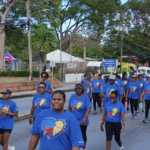STAT+: Trump nominates Casey Means, entrepreneurial doctor and MAHA leader, for surgeon general
5 months 3 weeks ago
Health, Politics, chronic disease, Donald Trump, Politics, RFK Jr., STAT+, White House
Bishop’s College defends title at 2025 National Nutrition Quiz
5 months 3 weeks ago
Carriacou & Petite Martinique, Education, Health, PRESS RELEASE, Youth, bishop's college, gfnc, grenada food and nutrition council, national nutrition quiz
Health – Demerara Waves Online News- Guyana
Nursing assistant wanted for alleged claims about Adriana Younge’s post-mortem; health minister mulls legal action for claims implicating him
5 months 3 weeks ago
Crime, Health, News, Politics, Adriana Younge, allegations, Ministry of Health, nursing assistant, post mortem examination, public mischief, wanted
Marine disturbances in Calivigny Harbour
5 months 4 weeks ago
Environment, Health, PRESS RELEASE, calivigny harbour, coast guard, marine affairs, Ministry of Health
Some snacks and hyperactivity: Is there a link?
5 months 4 weeks ago
Health, lifestyle, PRESS RELEASE, Youth, archives of disease in childhood, artificial colour, artificial sweeteners, FDA, food additive, Food and Drug Administration, gfnc, grenada food and nutrition council, healthy caribbean coalition, journal of children’s services, snack, sodium benzoate, the lancet
Medellín eyes partnership with Dominican Republic to boost health tourism
6 months 1 day ago
Health, tourism
Health Archives - Barbados Today
Lack of early autism screening a major concern, says association head
6 months 2 days ago
Health, Local News
PM on first official visit to Bolivarian Republic of Venezuela
6 months 2 days ago
Agriculture/Fisheries, Business, Health, Politics, PRESS RELEASE, Travel/Tourism, andy williams, bolivarian republic of venezuela, dickon mitchell, joseph andall, venezuela. nicolas maduro moros

